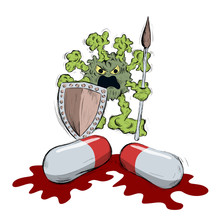What is an antibiotic?
It is a medication given to treat infections caused by
bacteria. However infections such as cold, flu and coughs caused by virus cannot
be treated by antibiotics. Antibiotics work by either killing the bacteria or
stopping them from multiplying through reproduction, stopping the infection
from spreading further.
How does antibiotic resistance occur?
 Antibiotic resistance develops when germs such as bacteria
and fungi develop the ability to destroy any drugs intended to kill them.
Antibiotic resistance develops when germs such as bacteria
and fungi develop the ability to destroy any drugs intended to kill them.
Some bacteria develops resistance to certain forms of
antibiotics naturally, while others can become immune if their genes change or
other bacteria develop drug-resistant genes and pass it on to the next
generations. The longer and more often antibiotics are used, the less effective
they are against these bacteria.
Some people believe that infections such as common cold can
be treated by antibiotics and
with this belief, they take antibiotics over the
counter without consulting a doctor and this misuse of antibiotic is one of the
main causes of antibiotic resistance in different bacteria.
In addition to this, the in-completion of the prescribed course
of antibiotic is another cause of bacteria resistance. Some people believe that
it is their choice whether they want to complete it or not and they assume that
this simple decision of theirs is very harmless and it has no effect on anyone
else. However, this can lead to bacteria forming resistance to that antibiotic
meaning that current treatments will no longer work and we will no longer be
able to treat even simple common infections.
The threats caused by antibiotic resistance crisis
 Antibiotic resistance in bacteria is a huge threat to
everyone. One of the biggest threats includes affecting our ability to cure
certain infectious diseases such as pneumonia, tuberculosis and gonorrhea. It
will also dismantle major medical developments, such as surgery, cancer
treatment and preterm baby care. Furthermore, it also challenges our ability to
achieve global health goals, such as reducing child mortality and improving
maternal health.
Antibiotic resistance in bacteria is a huge threat to
everyone. One of the biggest threats includes affecting our ability to cure
certain infectious diseases such as pneumonia, tuberculosis and gonorrhea. It
will also dismantle major medical developments, such as surgery, cancer
treatment and preterm baby care. Furthermore, it also challenges our ability to
achieve global health goals, such as reducing child mortality and improving
maternal health.
Antibiotic resistant infections can lead to longer hospital
stays, higher medical costs and more death.
To find more information on on antibiotic resistance as a global crisis click here to read a journal article on that.
 As individuals there are many ways in which we can help
prevent antibiotic resistance in bacteria. Antibiotics should be used only when
the need arises. Firstly, use an antibiotic that works only against the
particular type of bacteria you get infected with. Secondly, follow the advice
and instructions of your doctor and complete the antibiotic treatment as
prescribed and never offer an antibiotic or share it with others. Also, we should
stop asking for antibiotics whenever we get a sore throat, cold or flu because
antibiotics do not work on those. This way we can all control the spread of
antibiotics in bacteria.
As individuals there are many ways in which we can help
prevent antibiotic resistance in bacteria. Antibiotics should be used only when
the need arises. Firstly, use an antibiotic that works only against the
particular type of bacteria you get infected with. Secondly, follow the advice
and instructions of your doctor and complete the antibiotic treatment as
prescribed and never offer an antibiotic or share it with others. Also, we should
stop asking for antibiotics whenever we get a sore throat, cold or flu because
antibiotics do not work on those. This way we can all control the spread of
antibiotics in bacteria. You can read a journal article on antibiotic resistance prevention here
For more information check the link below.




